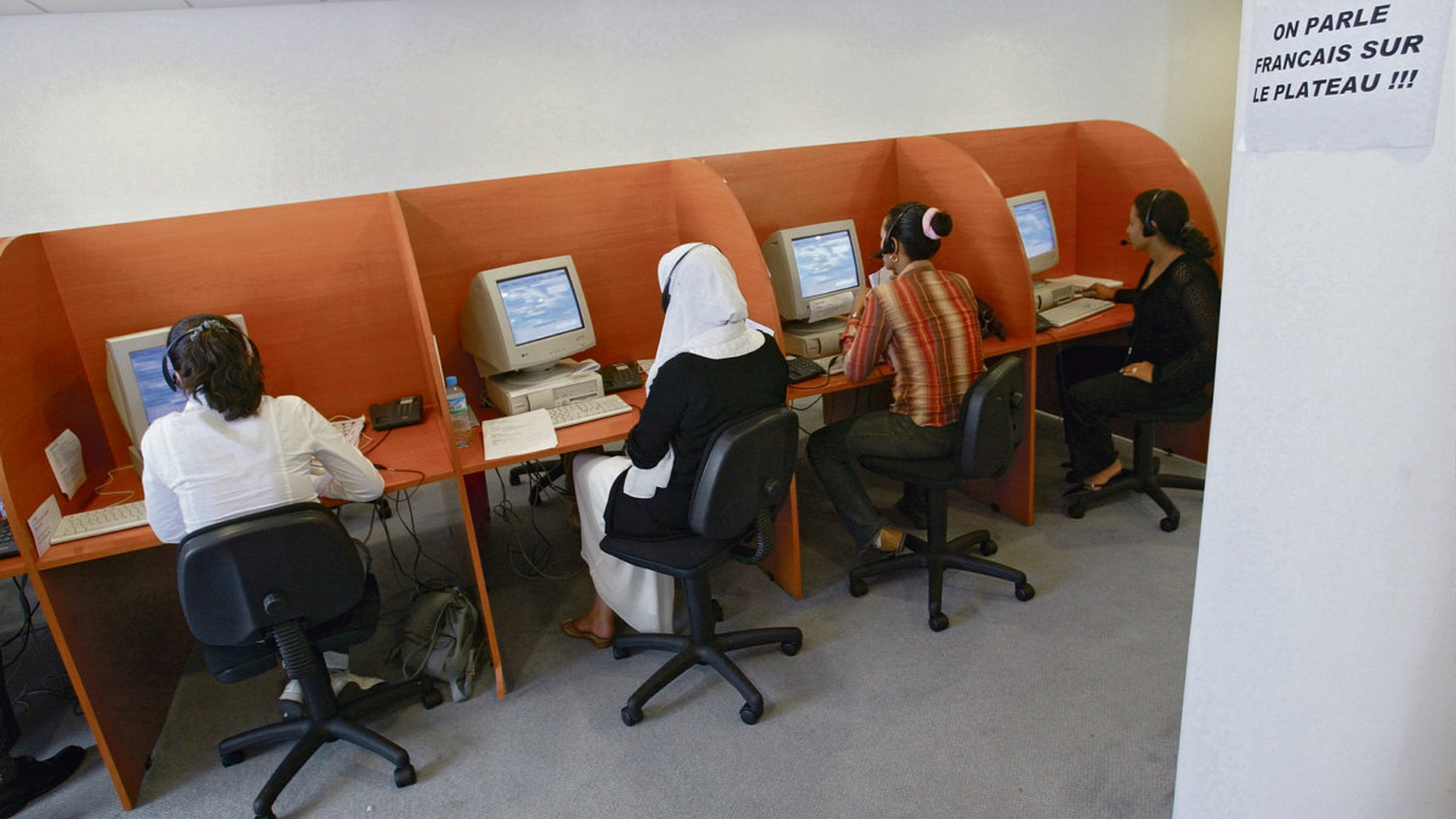In Morocco, they go to work with fear in their bellies
inquiry
In Morocco, they go to work with fear in their bellies
by
Rosa Moussaoui
/
April 28, 2020
Report from a call centre in Morocco
Translator’s introduction
Described as ‘Europe’s call-centre capital’, the number of workers in the Moroccan ‘offshoring’ sector has risen from low-hundreds at the beginning of the 2000s to perhaps 100,000 today. First unionised in 2015, what conditions are call-centre workers – as employed by subsidiaries and contractors of Europe-based capital – facing during the Covid-19 crisis?
The following article was written by Rosa Moussaoui for the French left-wing daily L’Humanité on 10 April.
It was translated by al-Muzaharat, a collective translating the left in the Maghreb and wider Arabic-speaking world. You can follow them here.
On 19 March, Morocco ordered mandatory confinement for everyone, except those with a movement pass provided by the authorities in order to get to work. Amongst them are call-centre workers, going everyday to their offices, where neither the proper distancing nor adequate hygiene is guaranteed.
Criticised for exposing their workers to the risk of contagion through maintaining non-essential activities, the sector’s heavyweights – Majorel, or Comdata – have over the last weeks paid for publicity inserts in the press, boasting of the measures taken against Covid-19: taking temperatures, rearranging offices ( disinfected every evening), and the separation of desks.
Ayoub Saoud, the General Secretary of the Union marocaine du travail’s (UMT) call centre and offshore group, only sees ‘a media operation by the firms to restore their image’.1
‘The distancing measures aren’t always respected’, Saoud continued. ‘Sometimes the workers on rotation share the same desk and the same headset and, either way, they’re taking risks even going to work’, said the trade unionist. This was confirmed by Karim (their name has been changed), who works in a call center of LBOS Maroc, a subsidiary of Lycamobile. ‘Here, the miserable conditions alarmed us even before Covid-19, to the point when we got a judicial officer’s [constat d’huissier] certificate in order to take legal action. The premises – they haven’t got any windows – are cramped, the corridors are narrow, and there’s less than a metre between each agent. The company has given us disinfectant gel, but we have to buy masks ourselves, which have been obligatory in Morocco since Monday [6 April]. The management doesn’t listen to us – they’ve completely ignored our demands, and refused to invest a single centime’, Karim said.
Some employees can work from home, but the company has refused to either provide laptops or cover internet costs. Those with bad connections have to come to the office. For fear of being contaminated – and with no right-to-strike recognised in Moroccan law – several workers have already thrown in the towel. For those still going, it’s an uphill struggle. ‘With confinement, public transport has been reduced, there are fewer bus seats’, said Karim.
Holidays, or unpaid leave
To protect their profits, the multinationals’ clients are not only putting the health of workers in danger: they’re putting as much industrial pressure on them as possible.
The call centres have insistently ‘invited’ their employees to use their paid holidays, and even to take 2021 holidays. In a note addressed to members, the Chambre française de commerce et d’industrie du Maroc [the French Chamber of Commerce and Industry of Morocco] suggested that ‘if the number of paid holidays are insufficient, unpaid leave should be negotiated with employees’. And, it reminded members that ‘all employees (…) who are out of work, if employed by a struggling company, will benefit from a fixed sum of 2000 dirhams’ – equivalent to 180 Euros, half the average salary of a call centre worker.
‘This compensation is financed by a Covid-19 fund, from public funds and individual donations’, says Ayoub Saoud: ‘It was created to guarantee an income to employees of Small and Medium-sized Enterprises (SME) and Micro Enterprises (ME) that are heavily affected by the crisis. Why should the big beasts of telemarketing benefit from it, when they’re already got plenty of financial inducements? Let them turn to European contractors to guarantee the compensation of their employees!’
Between the risk of contracting Covid-19 and losing their jobs, these call-centre captives [forçats] have no choice other than to work again – with fear in their stomachs.
Picture credit: Millenium Call, un centre d’appels basé au Maroc. @ Denis Allard/REA
-
In full, the UMT’s Fédération Nationale des Centres d’Appel et des Métiers de l’Offshoring ↩
author
Rosa Moussaoui (@Rosamoussaoui)
Subscribe to Notes from Below
Subscribe now to Notes from Below, and get our print issues sent to your front door three times a year. For every subscriber, we’re also able to print a load of free copies to hand out in workplaces, neighbourhoods, prisons and picket lines. Can you subscribe now and support us in spreading Marxist ideas in the workplace?
Read next

Strikes in the Time of Coronavirus
March 19, 2020


